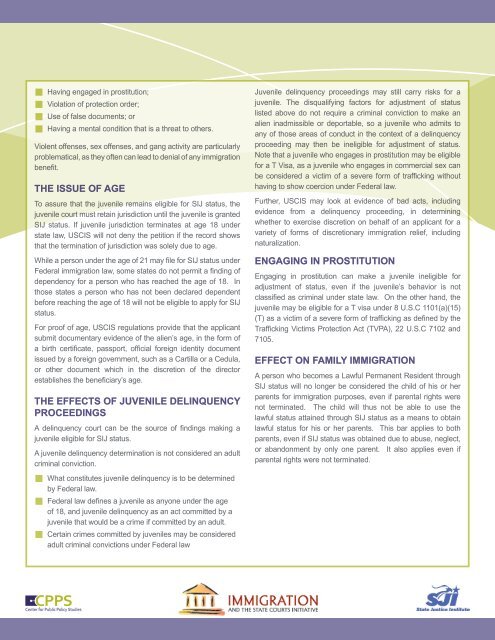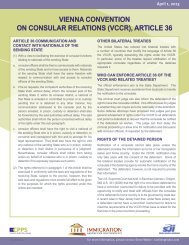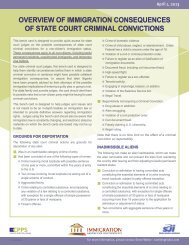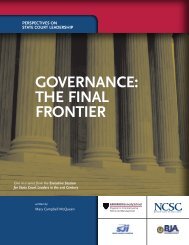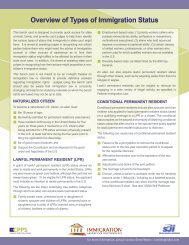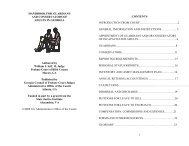SPECIAL IMMIGRANT JUVENILE (SIJ) STATUS
SPECIAL IMMIGRANT JUVENILE (SIJ) STATUS
SPECIAL IMMIGRANT JUVENILE (SIJ) STATUS
Create successful ePaper yourself
Turn your PDF publications into a flip-book with our unique Google optimized e-Paper software.
DRAFT<br />
QQ<br />
Having engaged in prostitution;<br />
QQ<br />
Violation of protection order;<br />
QQ<br />
Use of false documents; or<br />
QQ<br />
Having a mental condition that is a threat to others.<br />
Violent offenses, sex offenses, and gang activity are particularly<br />
problematical, as they often can lead to denial of any immigration<br />
benefit.<br />
The Issue of Age<br />
To assure that the juvenile remains eligible for <strong>SIJ</strong> status, the<br />
juvenile court must retain jurisdiction until the juvenile is granted<br />
<strong>SIJ</strong> status. If juvenile jurisdiction terminates at age 18 under<br />
state law, USCIS will not deny the petition if the record shows<br />
that the termination of jurisdiction was solely due to age.<br />
While a person under the age of 21 may file for <strong>SIJ</strong> status under<br />
Federal immigration law, some states do not permit a finding of<br />
dependency for a person who has reached the age of 18. In<br />
those states a person who has not been declared dependent<br />
before reaching the age of 18 will not be eligible to apply for <strong>SIJ</strong><br />
status.<br />
For proof of age, USCIS regulations provide that the applicant<br />
submit documentary evidence of the alien’s age, in the form of<br />
a birth certificate, passport, official foreign identity document<br />
issued by a foreign government, such as a Cartilla or a Cedula,<br />
or other document which in the discretion of the director<br />
establishes the beneficiary’s age.<br />
The Effects of Juvenile Delinquency<br />
Proceedings<br />
A delinquency court can be the source of findings making a<br />
juvenile eligible for <strong>SIJ</strong> status.<br />
A juvenile delinquency determination is not considered an adult<br />
criminal conviction.<br />
QQ<br />
What constitutes juvenile delinquency is to be determined<br />
by Federal law.<br />
QQ<br />
Federal law defines a juvenile as anyone under the age<br />
of 18, and juvenile delinquency as an act committed by a<br />
juvenile that would be a crime if committed by an adult.<br />
QQ<br />
Certain crimes committed by juveniles may be considered<br />
adult criminal convictions under Federal law<br />
Juvenile delinquency proceedings may still carry risks for a<br />
juvenile. The disqualifying factors for adjustment of status<br />
listed above do not require a criminal conviction to make an<br />
alien inadmissible or deportable, so a juvenile who admits to<br />
any of those areas of conduct in the context of a delinquency<br />
proceeding may then be ineligible for adjustment of status.<br />
Note that a juvenile who engages in prostitution may be eligible<br />
for a T Visa, as a juvenile who engages in commercial sex can<br />
be considered a victim of a severe form of trafficking without<br />
having to show coercion under Federal law.<br />
Further, USCIS may look at evidence of bad acts, including<br />
evidence from a delinquency proceeding, in determining<br />
whether to exercise discretion on behalf of an applicant for a<br />
variety of forms of discretionary immigration relief, including<br />
naturalization.<br />
Engaging in Prostitution<br />
Engaging in prostitution can make a juvenile ineligible for<br />
adjustment of status, even if the juvenile’s behavior is not<br />
classified as criminal under state law. On the other hand, the<br />
juvenile may be eligible for a T visa under 8 U.S.C 1101(a)(15)<br />
(T) as a victim of a severe form of trafficking as defined by the<br />
Trafficking Victims Protection Act (TVPA), 22 U.S.C 7102 and<br />
7105.<br />
Effect on Family Immigration<br />
A person who becomes a Lawful Permanent Resident through<br />
<strong>SIJ</strong> status will no longer be considered the child of his or her<br />
parents for immigration purposes, even if parental rights were<br />
not terminated. The child will thus not be able to use the<br />
lawful status attained through <strong>SIJ</strong> status as a means to obtain<br />
lawful status for his or her parents. This bar applies to both<br />
parents, even if <strong>SIJ</strong> status was obtained due to abuse, neglect,<br />
or abandonment by only one parent. It also applies even if<br />
parental rights were not terminated.


